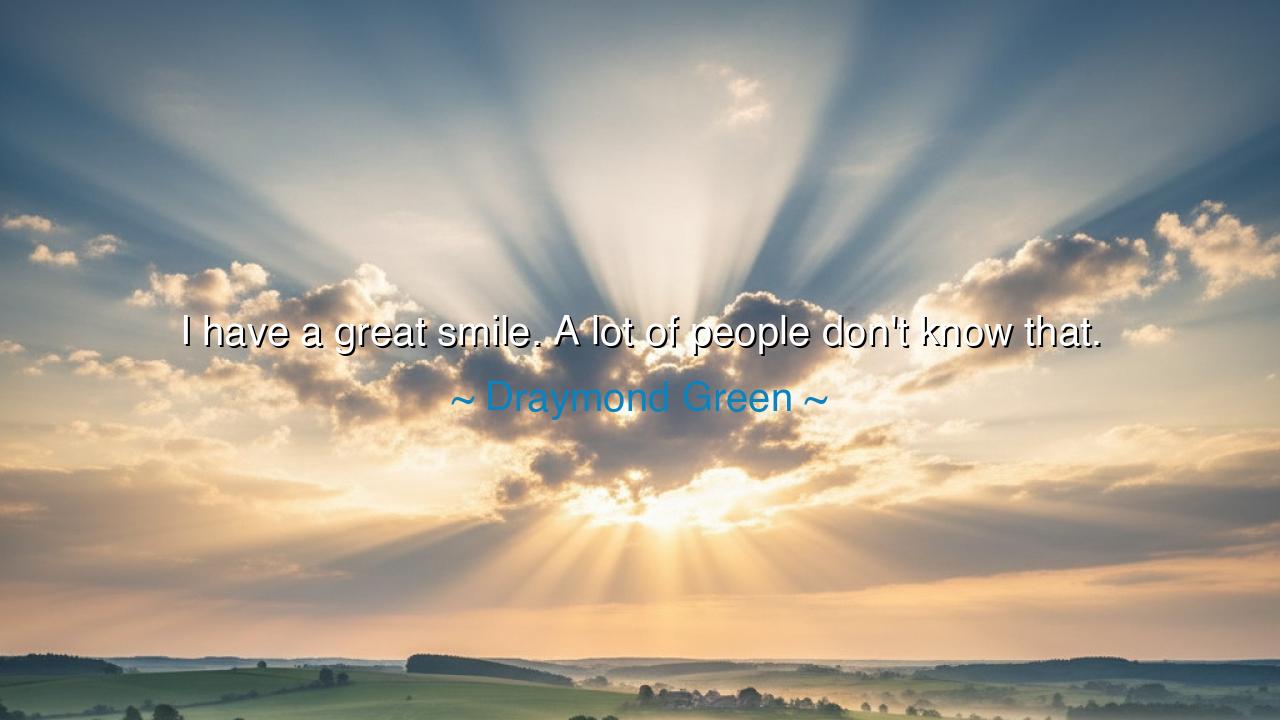
I have a great smile. A lot of people don't know that.






The words of Draymond Green rise not as a boast, but as a revelation: “I have a great smile. A lot of people don’t know that.” At first, it may seem like the playful pride of an athlete known more for his fiery intensity than for his gentle charm. Yet beneath these words lies a deeper truth about perception, about identity, and about the hidden treasures that often go unseen in the lives of men and women. For the world, in its haste, sees only the surface of strength, aggression, or ambition, and forgets that behind the armor there is still light, still softness, still humanity.
A smile is more than a curve of lips—it is a window into the heart, a sign that joy and warmth dwell within. For one such as Draymond Green, whose reputation is often tied to battle on the court, to claim his smile is to remind the world that every warrior carries gentleness alongside ferocity. This duality is ancient: the lion who roars also protects his cubs, the soldier who hardens his face in battle also softens it in peace. So it is with Green’s words. They tell us that identity is never singular—within each person lies many sides, and often the kindest one is overlooked.
History itself bears witness to this truth. Think of Theodore Roosevelt, remembered for his rough-rider courage, his booming speeches, and his indomitable will. Yet those who knew him privately spoke of his hearty laughter and his broad smile, which could fill a room with warmth as easily as his voice could command a crowd. To the world, he was a warrior-president. To his family, he was a man of affection and joy. Like Green, Roosevelt’s smile was part of his greatness, though many knew him only for his fire.
The saying also carries a subtle challenge: it is not enough to be known only for your toughness, your battles, or your achievements. One must also let the light within be seen. Too often, the world rewards hardness and overlooks kindness. But what Green admits with honesty is that within the competitor, there is also joy. He acknowledges it, even if others have missed it. And in this, his words become a reminder to us all: do not let your truest warmth remain hidden.
Yet there is also power in the hidden smile. It is like a treasure kept within, revealed at the right time to surprise and transform. When one who seems stern reveals kindness, its effect is doubled. Think of the legendary Japanese samurai who, after a duel, spared his opponent with a bow and a smile. That single gesture carried more weight than the edge of his sword, for it revealed humanity in the midst of conflict. The hidden smile, when revealed, breaks barriers and softens hearts more than any word or deed could.
The lesson, then, is this: do not underestimate the strength of joy. To smile is not weakness, but power. Show it often, not only to those closest to you, but also to those who least expect it. Let your smile be the bridge between your public battles and your private truths. If you are known for fire, surprise the world with warmth. If you are known for laughter, let your seriousness also be respected. In this balance lies true greatness.
Therefore, let all who hear this teaching act with courage: reveal your hidden light. Do not let the world define you by only one part of your character. Speak as Green spoke, with honesty, that you too carry joy, beauty, and warmth. Share it with others, even if they do not expect it. For a smile—whether well-known or hidden—is a gift that endures beyond the battles, beyond the victories, beyond the noise of the world.
So carry this wisdom forward: “I have a great smile. A lot of people don’t know that.” May it remind you that within every fierce heart there lies gentleness, and within every strong soul there dwells a light. Let your smile be known, for in showing it, you reveal not only yourself, but the divine spark that dwells in every human being.






AAdministratorAdministrator
Welcome, honored guests. Please leave a comment, we will respond soon